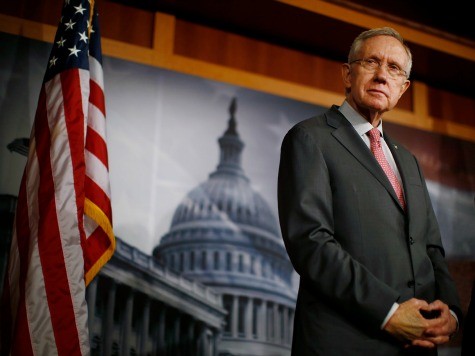
On the game-changing radical move to remake the federal courts, top Senate sources tells Breitbart News several things about the Nov. 21 change of the fundamental rules of the U.S. Senate, and its implications for the nation. Democrats “will rue the day” they pushed the button on the nuclear option, these sources promise.
Although Senate rules can only be changed by a two-thirds vote (67 out of 100 senators), Sen. Harry Reid (NV) did so by an essentially unprecedented move called the “nuclear option,” as Breitbart News has previously explained. He asked the presiding officer of the Senate to rule that Senate Rule 22–the 60-vote requirement to invoke cloture to end Senate floor debate and end a filibuster–does not apply to presidential nominations for any federal office except the Supreme Court.
When the presiding officer ruled that this defining rule of the Senate does in fact properly apply (as it always has), Reid appealed the ruling of the chair. As my Bretibart News colleague Joel Pollak reported, by a vote of 52-48, earlier today Senate Democrats overruled the chair.
Only Democrats voted for this change. And three Democrats–Carl Levin (MI), Mark Pryor (AR), and Joe Manchin (WV)–joined every Republican in voting against it.
Senators are enraged. Breitbart News has learned the following:
First, there was no deal with any Republicans on this. Unlike previous conflicts where some Republican senators joined with some Democrats, this was a 100% Democratic effort.
Senators who have previously worked with the Democrats–like John McCain and Lindsay Graham–reportedly feel betrayed, and will not work with Democrats on any deal on nominations anymore. Sources say McCain in particular begged Reid not to cross this line. Some controversial nominees are on shaky enough ground that they might need some Republican support to get a majority. Those votes may no longer be available.
Second, Republicans will now fight each of these nominees, rather than casually allow them to go through. They want to make Democrats own these nominees if they are confirmed, as they likely will be quickly.
Whenever cloture is invoked, Senate rules still allow for 30 more hours of debate before the vote. Normally when cloture happens the remaining senators wrap up debate quickly to have a final vote and move on the next item of Senate business. Now, senators may use much of this time to continue the debate, both to highlight this issue for the American people and to make Reid and the Democrats pay a price of delaying all other Senate business.
Third, several judicial nominees have a record of shocking statements that will not play well on those Democrats’ statements. So Republican campaign strategists will now make this vote a top issue against certain vulnerable Democratic senators in 2014.
Fourth, this elevates the courts as an issue not only for the 2014 midterms, but also for the 2016 presidential election. And it is an issue that polls show favors conservatives. Expect more talk about the critical role the courts play in our national life, and for that to shape campaigns both in the primaries and the general election.
Fifth, now that the Democrats have changed the governing standard, if a Republican takes the White House in 2016, the shoe will be on the other foot. You can expect a Republican president to nominate unapologetically conservative judicial nominees and demand a final vote where 51 votes is enough to confirm them.
Sixth, in addition to those lower-court nominees, likely the only reason Democrats did not declare a change on the filibuster rule for Supreme Court nominations is because they do not expect President Obama will get another Supreme Court opening to fill. But there is no principled reason to say that Senate Rule 22 does not apply to nominees to the circuit courts of appeals, district courts for trials, or any executive-branch positions, but still somehow applies to Supreme Court nominees. Do not be surprised if a future Republican majority cites this as the standard for a conservative nominee from a conservative president at all levels of the federal courts, including the Supreme Court.
The Senate runs on precedent. Democrats have now jettisoned many decades of precedent, and in doing so have created a new precedent. Republicans are completely justified in adhering to this new standard in the future, where it will greatly benefit conservatives seeking to restore the Constitution.
Finally, as Pollak also wrote yesterday, when Carl Levin voted against the nuclear option today, he did so saying that this endangered the filibuster for legislation as well. If the minority’s ability to filibuster bills in the Senate disappears, the Senate would henceforth function like the House, which would be a profoundly destabilizing change in how the federal government works.
And no one knows where that would lead.
Ken Klukowski is senior legal analyst for Breitbart News. Follow him on Twitter @kenklukowski.

COMMENTS
Please let us know if you're having issues with commenting.